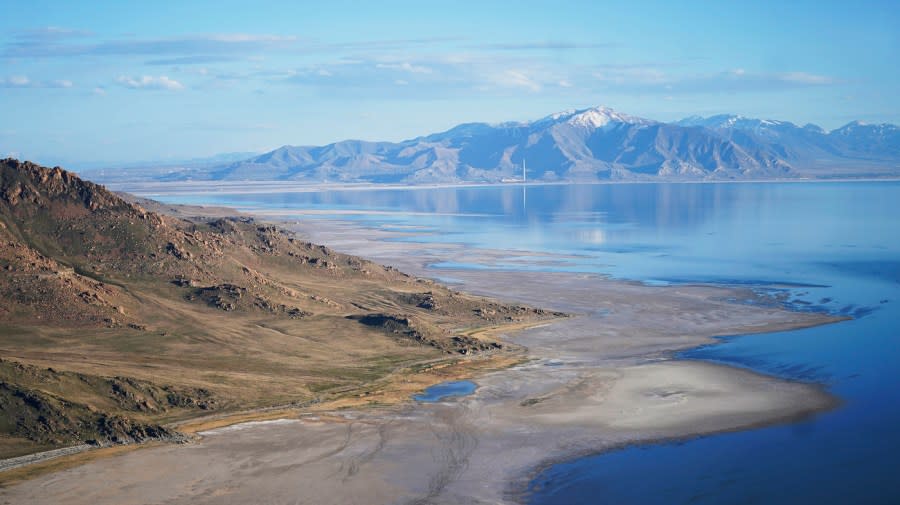Legal scholars accuse Utah of failing to curb the Great Salt Lake’s decline

Three dozen law professors from across the country are demanding that a Utah district court hold the Beehive State responsible for the declining water levels in the Great Salt Lake.
The professors submitted an amicus brief on Friday in support of a lawsuit — launched by conservation groups in the fall — alleging that Utah has failed to ensure that enough water reaches the Great Salt Lake.
The writers also declared their opposition to motions to dismiss the case, which were filed by private water users, water conservancy districts, municipalities and state agencies.
“The Great Salt Lake’s precarious future is not beyond legal remedy,” the professors stated.
Instituting conservation measures for the benefit of the Great Salt Lake is a complicated endeavor, due to the dictates of the water rights system that dominates much of the U.S. West.
The system, which dates to the mid-19th century Homestead Act, enabled users to divert water on a first-come, first-serve, priority basis — meaning that imposing usage cutbacks for the sake of the lake could infringe upon a higher-priority user’s water rights.
But the conservation and community groups that sued the State of Utah in September argued that upstream diversions have led to a significant decrease in the Great Salt Lake’s water — and that the state has a responsibility to protect this public resource.
“The Great Salt Lake belongs to the people of Utah,” Stu Gillespie, senior attorney with one of those conservation groups — Earthjustice — said in a statement. “It is time for the state to fulfill its obligation to protect this resource and address the unsustainable upstream water diversions that are putting it at risk.”
The path toward reversing the basin’s declining water levels and ecological collapse involves harnessing what’s known as the “public trust doctrine,” the law professors wrote in the amicus brief.
Such doctrines require governments to hold natural resources in trust for the public, with such resources typically including navigable waters and their submerged lands, per the brief.
In Utah, the public trust doctrine dates at least back to the state’s 1896 establishment and was enforced in its constitution — which recognized the doctrine’s applicability to lands and water and the concept of “beneficial use” as the basis for fulfilling those rights, the professors noted.
Beneficial use refers to a rights holder’s requirement to only use a diverted water allocation for predefined purposes, such as irrigation, hydropower, domestic, municipal, commercial or mining uses.
Regarding the public trust doctrine, the state legislature also has declared that all state waters belong to the people of Utah, the professors explained, noting that other Mountain West states have applied their own such doctrines to water bodies like the Great Salt Lake.
Demanding that the court correct “the state’s shortsighted view of its trust obligations,” the writers stressed the need to apply the public trust doctrine to water law — which they described as being “frozen in the 19th century.”
“The state clearly has the authority to undertake water conservation measures necessary to restore the Lake,” they stated, noting that such measures could include changes to surplus water management in wet years and requiring efficiency improvements.
The writers stressed that “no vested rights need be threatened,” while emphasizing that these rights do not enable users “to divert a fixed quantity of water in perpetuity.”
“All water rights in the state are subject to the public interest and must be used for beneficial purposes without waste,” the professors stated.
“It is within the power of this Court to inform the state that the waste of the Great Salt Lake is neither in the public interest, nor is it a beneficial use,” they concluded.
In response to the amicus brief, Joel Ferry, executive director of the Utah Department of Natural Resources, said in a statement that he and his colleagues received the document and “plan to oppose it.”
Ferry described the amicus brief as “largely duplicative” of the plaintiffs’ complaint, noting that “Utah’s district court rules do not authorize such filings.”
“We have been — and will continue to — work to protect the interests of the state of Utah,” he continued, noting that the agency’s divisions are all “mindful” of their individual responsibilities.
“Together, we are addressing the need to protect the Great Salt Lake,” Ferry added.
For the latest news, weather, sports, and streaming video, head to The Hill.


